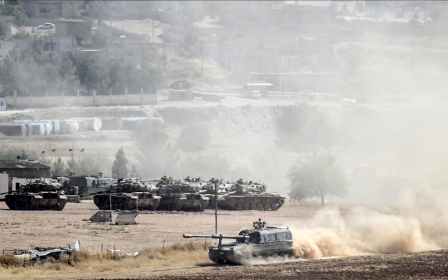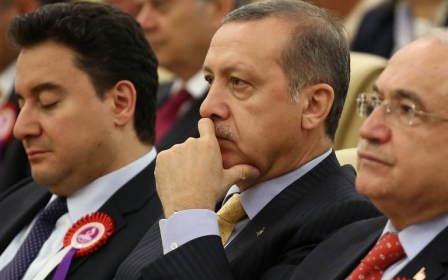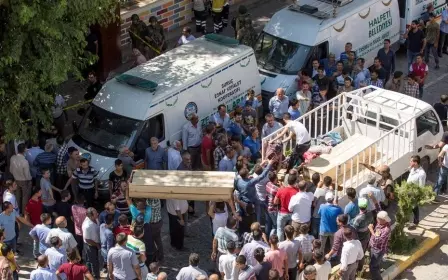Turkey vows further operations against IS and Kurdish militants

Prime Minister Ahmet Davutoglu vowed on Friday that Turkey would continue operations against Islamic State (IS) and Kurdish militants after it bombed IS targets in Syria and made nearly 300 arrests.
"The operations that were started today are not a single event but a process," Davutoglu told reporters in Ankara in televised comments.
Davutoglu said 297 people, including 37 foreigners, had been arrested in nationwide raids against suspected members of IS, Kurdistan Workers Party (PKK) and other militant groups.
But critics accused the government of targeting its political opponents, including members of the pro-Kurdish People’s Democratic Party (HDP) which gained 13 percent of votes in last month's parliamentary elections in which Davutoglu's Justice and Development Party (AKP) lost its parliamentary majority.
One woman, reported to be a member of a banned far-leftist group, was killed in a shootout with police in the Bagcilar district of Istanbul, according to the state-run Anadolu news agency.
Earlier on Friday, Turkish air force jets launched their first strikes on IS positions in Syria, following a suicide bombing in Turkey on Monday blamed on the group that claimed 32 lives.
“Three F-16 jets took off from Diyarbakir Eighth Main Jet Base Command at 03:12am (0012 GMT),” a statement from the prime minister's office said.
“Three IS targets were hit in an air operation between 03:40-03:53am." On Friday afternoon, AFP reported that the strikes had killed 9 Islamic State fighters.
Davutoglu said that the warplanes had been "100 percent" successful in eliminating their targets.
"Whichever terrorist organisation poses a threat to the borders of the Turkish Republic, measures will be taken without hesitation," said Davutoglu. "No one should have any doubt."
"We are observing activity in Syria and on the border at every moment. Turkey will show the strongest reaction to the slightest movement that threatens it."
"The operation against IS reached its target and will not stop," he added.
Davutoglu meanwhile dismissed suggestions that the Turkish government had warned the Syrian government of President Bashar al-Assad - which Ankara vehemently opposes - of the strikes.
He said there was "no question" of Turkey becoming a party in Syria's civil war, but insisted Ankara would take "all measures to protect its borders".
On Thursday, four Turkish tanks from the fifth armoured brigade opened fire on IS targets in Syria in the most serious cross-border clashes yet between the two sides.Turkey’s role in the international anti-IS coalition has been ambiguous at best. Despite owning the second largest land army in NATO, having a strong air force and sharing a 900-kilometre border with Syria, Turkey has been reluctant to take up a military interventionist role.
“This is a clear indication that Turkey now is shifting gear and supporting more actively the US-led coalition against IS,” Fadi Hakura, a Turkey expert at Chatham House security think tank, told Middle East Eye.
'Dragged into the quagmire'
“Turkey is getting more and more dragged into the quagmire in Syria and instability in Syria is now spilling over the border. Turkey is in a very precarious position largely because of its incoherent policy on Syria.”
Hakura highlighted the strategic importance of a deal sealed between Turkish President Recep Tayyip Erdogan and US President Barack Obama to allow US planes conducting airstrikes against IS to operate out of the Incirlik air base in southern Turkey.
After months of negotiations, Turkey finally gave the green light for the US to use the base for air strikes against IS on Friday.
“US officials characterise the move as a gamechanger. It will allow a more intensive campaign by US aircraft against IS in northern Syria,” he said.
Hakura said Turkey’s decision to change its position may also have been motivated by this month’s landmark nuclear deal between Iran and the US and other international powers.
“There was a fear in Ankara that this agreement would lead to closer coordination between Washington and Tehran over IS and Turkey did not want to be completely frozen out of the US calculations.”
Critics of the Turkish government said that Kurdish and leftist activists had been disproportionately targeted in Friday's raids with Ertugrul Kurkcu, an HDP member of parliament, writing on Twitter that 182 of those arrested were linked to the HDP and the DBP, another Kurdish party.
"I am afraid that the AKP will do anything and everything to stay in power and to eliminate the opposition it faces," Ayca Cubukcu, assistant professor of human rights at the London School of Economics, told MEE.
"The claims that Turkey is fighting a war on IS both inside and outside Turkey raises the suspicion that rather than IS, the real targets of the AKP government are Kurdish and Turkish socialists, revolutionaries and sympathisers of the HDP."
At least 61 of those arrested on Friday have been identified as linked to the PKK, including 35 in a raid by police in the southeastern province of Sanliurfa.
Twenty-one people were arrested in Izmir on suspicion of providing financial support to the so-called "parallel state" group linked to exiled cleric and government opponent Fethullah Gulen.
Among those arrested for suspected links to IS, Anadolu said police in Istanbul had detained a man identified as Halis Bayancuk, also known by the pseudonym Abu Hanzal, who is suspected of heading an IS-linked group in the city and was previously arrested in 2014 in a raid targeting al-Qaeda.
Middle East Eye propose une couverture et une analyse indépendantes et incomparables du Moyen-Orient, de l’Afrique du Nord et d’autres régions du monde. Pour en savoir plus sur la reprise de ce contenu et les frais qui s’appliquent, veuillez remplir ce formulaire [en anglais]. Pour en savoir plus sur MEE, cliquez ici [en anglais].





